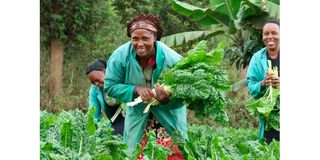Rights advocates call for feminist post-Covid recovery steps

Mary Muthoni harvests spinach at Kiawaithanji village in Nyeri County on October 13, 2021. Rights advocates have called for inclusive responses to enable women like Ms Muthoni bounce back from the effects of Covid-19.
What you need to know:
- Women's rights advocates from 35 African countries want post-Covid-19 recovery measures to be rooted in feminist principles of inclusivity, equality, justice, solidarity and well-being.
- They have demanded for equal representation in all relevant decision making institutions.
Inequalities that had otherwise been reduced in decades of active interventions will worsen if post-Covid-19 recovery measures fail to address systemic barriers to women and girls’ progress, feminists said last week.
Women's rights advocates from 35 African countries converged in Nairobi in a hybrid two-day Pan-African Feminists Retreat to forge the way forward in recovering from damages caused by the pandemic in gender equality front.
They demanded for equal representation in all relevant decision making institutions.
“All post-Covid-19 recovery measures must be rooted in feminist principles of inclusivity, equality, justice, solidarity and well-being,” said Emma Kaliya, chairperson to the board of African Women's Development and Communication Network (Femnet) which organised the retreat themed Rekindling the Pan-African Feminism Spirit: An Inclusive, Just, Sustainable and Transformative Society Post-Covid-19.
Gender-based violence
She said the fact that the women and girls have been disproportionately affected in loss of income and exposure to gender-based violence, calls for inclusive responses to enable them bounce back at the same pace with men and boys.
UN Women and UN Department of Economic and Social Affairs projected in their joint Progress on the Sustainable Development Goals: The Gender Snapshot 2020 report that 34 million women and girls in Sub-Saharan Africa could live in abject poverty in the next decade, owing to Covid-19 disrupting empowerment interventions.
And as African countries vaccinate their people, she said governments must ensure equity in availing the jabs to its population.
Covid-19 vaccines
“Vaccine equity is a feminist issue! We must continue pushing for equitable, accessible and affordable Covid-19 vaccines,” she said.
Femnet executive director Memory Kachambwa, said women and girls cannot be put on the waiting list as the world moves fast to lift itself out of the Covid-19 ruins.
“Without immediate action by the international community, national governments, civil society and the private sector, only the handful of nations that hold the greatest amount of global wealth will recover,” she said.
“Girls and women cannot wait.”
She said lack of international cooperation in responding to the pandemic has worsened inequities between nations and further divided citizens into “haves and have nots”.
To address the lack of synergy, she called on feminists to collaborate in calling for a united action against Covid-19.
Abusive partners
National Gender and Equality Commission chairperson Dr Joyce Mwikali said the pandemic has made the situation worse for the vulnerable women that those “who recently escaped extreme poverty will likely fall back into it.”
She expressed her worry over the long-term effects of the pandemic on women's socio-economic development.
“Without sufficient economic resources, women are unable to escape abusive partners and face a greater threat of sexual exploitation and trafficking. These consequences won’t disappear when the pandemic subsides,” she said.
“Women are likely to experience long-term setbacks in work force participation and income. Impacts on pensions and savings will have implications on women’s economic security far down the road.”
Meanwhile, Nairobi County Woman Representative Esther Passaris, urged women to be their fellow support systems.
“As long as women engage in a competitive gear against a fellow woman, then we cease to help each other. We have to ensure that we don’t pull each other down,” she said.




